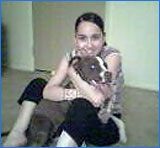If you are looking for the greatest gold-mine of easy to use "change your dog's behavior" advice ever crammed into a newsletter series then read on!
Also, make sure that you check out our 100% authentic testimonials from people who have bought Secrets to Dog Training and find out the massive difference it has made to their owner-dog relationship!
 "Hi Daniel, I would like to thank you for making my life easier. Since I purchased your book Sugar and I have become so close, I can take her out on walks in front of people, she would always become too hyper by other people that she was intolerable. She now is a well trained companion that I can take everywhere. Because she is a pit bull she needed to be well trained because of their reputation but now every where we go they understand why her name is Sugar, she is a sweet dog."
"Hi Daniel, I would like to thank you for making my life easier. Since I purchased your book Sugar and I have become so close, I can take her out on walks in front of people, she would always become too hyper by other people that she was intolerable. She now is a well trained companion that I can take everywhere. Because she is a pit bull she needed to be well trained because of their reputation but now every where we go they understand why her name is Sugar, she is a sweet dog."
-- Abril Quintana (USA)
Dear Daniel
I have a very alpha border terrier and a non-alpha pug. My alpha border continually challenges me but remains submissive to me - yet he's always there pushing the button. I'll explain as we go. I am a foster home for strays and rescues from the shelters. I foster until the dogs are adopted and this turnover is about every 2 weeks. Most rescues I place are small dogs and most come with issues.
Should I always let my border terrier be alpha or dominant to the foster? Should I try to not let any of the dogs show dominance to each other? If there are dominance displays, should I allow them to find their own level in the "pack" or should I ensure my alpha border stays as top dog in the pack (behind us humans, of course!)? Should I discourage my border from displaying dominance (he always tries)? What if the foster sees this as a weakness and starts trying to overdominate him (snap at his food, shove him out of the way for attention, etc.)? This is a short term situation with each dog. The one thing I want to do is make sure they all know who's alpha - me and us humans. After that, what should the pecking order look like given the temporariness of the fosters? I don't want to squelch their friskiness but I also dont want to belittle my own pooch, the border terrier.
One result of ensuring alpha-ness came with not allowing him to be near our table when we're eating. The other dogs, foster included, will calmly sleep on their pillows in the family until we are finished eating. But my border will not stay in the room when we eat. The minute we start to eat, he leaves the room and stays in our bedroom. If I try to make him stay in the family room, he'll stay standing or at least with his back to us! Should I let this continue? If not, what should I do? He started doing this when the first foster came in the house and I was training the foster not to stay under the table when we eat. Sort of like my border says,"Well, I won't stay under the table but I'm also not going to stay with these others, I'd rather have my OWN place while you eat". Then he'll leave and he'll come back when we are done eating.
If you can answer these questions, I'd be most grateful. It will bring about peace in this home!
Kellie
Hi Kellie,
Thanks for your email. Firstly let me congratulate you on fostering these rescue dogs! It takes a patient and kind person to do that job, so good on you!
You have asked some interesting questions!
One very important thing you need to do is assert yourself as the Alpha Dog in your household. Make sure that all of the dogs, whether it be your Terrier, or any of the rescue dogs, know that YOU are the Top Dog, and are to be respected! Discourage any attempts at dominance over you. Please read and utilize the techniques outlined in your bonus book "Secrets to becoming the Alpha Dog".
Is your Terrier neutered? This might be an option if you find that he is constantly challenging you for dominance.
As far as the Dominance between your dogs, it is probably best if you let them sort the hierarchy out themselves. If you think that there is any danger of things getting out of hand, you might want to muzzle your dogs. It is OK for your Terrier to show dominance over the other dogs, but not over you.
It is your responsibility to ensure that the dominant dog is treated like the dominant dog (after you of course) and that the submissive dogs position is also reinforced. Please read the chapter in Secrets to Dog Training on "2 Dogs in the House" for tips on how to do this. Although to humans this might seem mean, to a dog, hierarchy is perfectly natural, and you should find that if you reinforce their place in the pack, they should all get along quite happily.
Your dogs refusal to remain in the dining room while you are eating is a very interesting behavior! It is quite likely that it is a challenge for dominance over you, so I recommend that you ensure he remains in the room to enforce your Alpha position. Ask him to sit, or lie down, and wait until you have finished your meal before allowing him to move.
As a general rule, always make sure that your dog's get plenty of exercise, including regular obedience training (train your dogs separately). If possible, give each dog some one-on-one time with you every day.
Good luck Kellie. Please let me know how you progress with these issues.
Kind regards,
![]()
Daniel Stevens and the Secrets to Dog Training Team
"Secrets to Dog Training - STOP Dog Behavior Problems!"
Kellie's Reply:
Thank you, Daniel, for your kind words of encouragement. I do enjoy fostering and being able to make these dogs more adoptable (we usually get the extremes which usually makes them less attractive for adoptions). I found your site and was thrilled to be able to talk to someone about my problems, with the alpha dog method in mind.
To the extent I know what I'm doing about which does or does not keep me in the alpha position, I'm doing all I can. In fact, my border was a pain and got us thrown out of the agility ring because of his dog aggressiveness. He is much more controllable now. He now doesn't automatically charge out the doors, resigns himself to never get on the couch or bed or chair without my permission, and other things you've mentioned in your alpha book. Because I took so much of dominance away from him I was feeling guilty about this mealtime thing. So thank you very much for your suggestions.
Yes, my terrier is neutered (at about 3 months age). I don't mean to say he's aggressive to me - he just keeps finding new ways (like this dinner thing) to push my button.
I tried your suggestion tonight and he stayed in his area without leaving and finally in a relaxed position! I believe the difference this time is I wasn't guilty about removing all his dominance towards me (he has always loved to lead - now I won't let him). I simply gave him the command to sit in this spot - no ifs ands or buts. Wow! It worked! Thanks again.
On the matter of dominance over other dogs, I sort of had the impression from fellow rescuers that I should always make sure my doggies stay in the upper hand. But I didn't find that always worked. I basically do as you say, let them sort their own way and level. Except in a couple of spayed females, my border was in each case always the top dog. But came the first female and all of a sudden he allows her to be dominant (she was a dominant type) and I wasn't sure if I should have imposed (I didn't) and things seem OK. But now you've confirmed it's OK and that eases my mind.
We do walks, especially with the foster dogs this is very helpful to get rid of all that pent up energy. One-on-one time is sparse with the fosters and perhaps too sparse for my border because he seems to be more my companion between fosters. So I'll work on that more.
Again, thank you very much.
Kellie
 I've been a professional dog trainer for well over 20 years, and in that time I've helped thousands of dog owners just like you to get the friendly, well behaved, slipper fetching, best pal they always wanted.
I've been a professional dog trainer for well over 20 years, and in that time I've helped thousands of dog owners just like you to get the friendly, well behaved, slipper fetching, best pal they always wanted.
But it didn't start out that way. I've always loved dogs, some things never change. But when I first started my professional dog training career I relied on the so-called 'best practices' when it came to dog behavior training. It was only when I heard people tell me over and over again that they just weren't seeing results that I started to question the old accepted wisdom. So I started a journey, a quest to search out the best, most effective, techniques, tips, and tricks that really work.
And that's how I came up with Secrets to Dog Training. Year after year I found new techniques that achieved the results I wanted. Eventually I had a whole book worth of great resources: Secrets to Dog training...
So, if you want to:
Then Secrets to Dog Training is just what you've been looking for!
Previous Newsletters
| 01 | 02 | 03 | 04 | 05 | 06 | 07 | 08 | 09 | 10 | 11 | 12 | 13 | 14 | 15 | 16 | 17 | 18 |